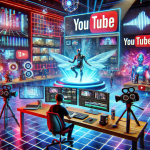As artificial intelligence (AI) continues to evolve, its influence is extending into almost every corner of society, including the realm of Not Safe for Work (NSFW) content. While the connection between ai nsfw content might spark controversy, it is an area that raises powerful questions about technological ethics, regulation, and societal norms. Let’s explore what’s happening in this space and why it’s becoming a trending—and contentious—topic.
Expanding Capabilities of AI in Content Generation
AI-powered tools have become remarkably advanced at generating visually compelling, highly realistic content in recent years. Tools like DALL-E, Stable Diffusion, and MidJourney have demonstrated their abilities to create astonishingly detailed images, some even indistinguishable from those made by human artists. However, this technology has also been co-opted to generate explicit content without posed models, often sparking concerns about privacy and consent.
An unsettling example of this is the rise of “deepfake” technology, which uses AI to superimpose or manipulate faces and voices into videos. According to Deeptrace, a cybersecurity company, 96% of deepfakes found online are NSFW. This includes everything from digitally altered pornography to synthetic revenge videos, raising major ethical red flags. Such statistics reveal how AI, although an incredible innovation, is contributing to explosive growth in unregulated NSFW content.
Growing Ethical Challenges Around Consent
Perhaps the most pressing concern surrounding AI-generated NSFW content is the issue of consent. Many individuals have found themselves victims of explicit content they never agreed to, as algorithms use publicly available information to replicate their faces or voices. According to a 2023 survey from Norton LifeLock, 46% of adults in the U.S. worry their personal photos or videos could be manipulated into NSFW content using AI.
Consensual creation is another aspect up for debate. On certain platforms, creators are beginning to experiment with AI tools to produce NSFW material. While this may open doors for innovation in how adult entertainers or artists operate, it also diminishes the authenticity of the content, further blurring lines between human-made and synthetic material.
Content Moderation vs. Explosion of AI Tools
Another hot topic in this space is the challenge of moderating AI-generated NSFW content online. Platforms are already struggling to monitor and remove harmful or inappropriate user posts. Introducing AI-created media only multiplies the complexity of identifying whether such content violates guidelines. Algorithms are often fooled, as fake content is not always easy to differentiate from real content programmatically.
According to a report by the Internet Watch Foundation (IWF), there has been a 31% increase in reported child exploitation materials in 2022—a figure highly concerning given that certain AI models exacerbate this trend. This has put immense pressure on tech companies to refine AI’s ability to spot inappropriate or illegal materials while creating strict ethical boundaries on its use.
Regulation of AI NSFW Content in the Future
The future of AI-powered NSFW content largely hinges on the steps governments and tech companies take to regulate its development and deployment. Current legislations like the EU’s AI Act aim to establish clear rules regarding facial manipulation technology and content considered harmful. However, regulations remain fragmented around the world, leaving loopholes for unethical practices to persist.
Furthermore, digital platforms such as social media networks are introducing advanced AI moderation tools to combat the spread of harmful NSFW material. Yet, as AI becomes more accessible, experts fear the speed at which the technology evolves could outpace attempts to regulate it effectively.
Final Thoughts
The future of AI in NSFW content lies at a crossroads of innovation and potential misuse. While advancements in AI provide exciting opportunities for creativity and engagement, they also demand serious conversations about ethics, consent, and regulation. Society is faced with the challenge of balancing technological progress with humanity’s moral compass—a tightrope that has only just begun to stretch.









